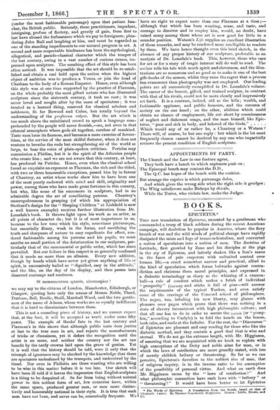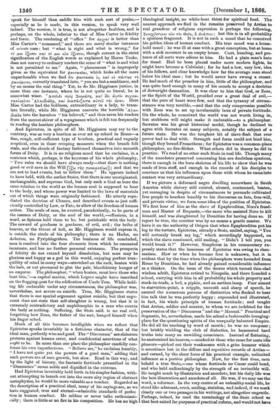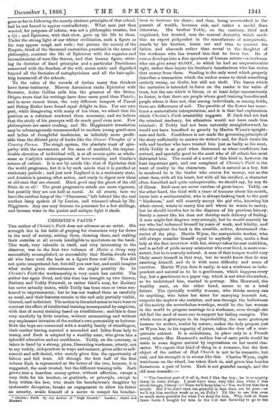BOOKS.
EPICTETUS.*
Tuts new translation of Epictetus, executed by a gentleman who commanded a troop of black soldiers during the recent American campaign, will doubtless be popular in America, where the fiery breath of war and the wild winds of political change have rapidly dissipated the mists and fogs of transcendentalism, and converted a nation of speculators into a nation of men. The doctrine of fortitude, first growled by Zeno and his disciples at the pigs in the sty of Epicurus, and latterly shaken like a lion's mane in the faces of pale emperors with unlimited control over human life,—a creed somewhat narrow and practical, allied to the kind of speculation which forms bulwarks against contra- diction and christens them moral principles, and expressed in a dialectic terminology as sharp as the whizzing of a cannon- ball—a rule of conduct which makes a fetish of individual " prosperity " (cupola) and sticks it full of pins—will answer the requirements of the typical Yankee, and even satisfy some of the cravings of the Concord school of philosophers. The negro, too, inhaling his new liberty, may glance with pleasure over pages which prove that there was nothing in a state of slavery inconsistent with high philosophic culture ; and that all one has to do in order to secure the Eupora (or "pump- kin," according to Carlyle) is to fold the hands on the bosom, look calm, and smile at the Infinite. For thereat, the " Discourses " of Epictetus are pleasant and easy reading for those who like the dialectic method, and they contain a good deal that is wise and eternal. We do not go the extreme length, with Mr. Higginson, of asserting that we are acquainted with no book so replete with high conceptions of the Deity and noble aims for man, or in which the laws of retribution are more grandly stated, with less of merely childish bribery or threatening. So far as we can perceive, Epictetus's devotion to the noblest aim of man, that of religious inquiry, is in the inverse ratio to his assumption of the possibility of personal virtue. And what on earth does Mr. Higginson mean by the "laws of retribution?" And what philosophic connection have such laws with " bribery " or "threatening?" It would have been better to let Epictetus * The Works of Epictelets. A Translation from the Greek, based on that of Elizabeth Cater. By Thomas Wentworth Higginson. Boston: Little, Brown, and Co. speak for himself than saddle him with such sort of praise,— especially as he is made, in this version, to speak very well indeed. The version, it is true, is not altogether faultless, and is perhaps, on the whole, inferior to that of Miss Carter in fidelity and force. The rendering of " office " for apvci is better than Miss Carter's "command," and there are many similar instances of minute care ; but "what is right and what is wrong," for ei go: kgrri ;cal ri got dm i'Egeriv, though correct in the strict signification of the English words as explained by Horne Tooke, does not convey to ordinary readers the sense of "what is and what is not permitted to me." Again, " phenomena " is improperly given as the equivalent for 9avrauica, which looks all the more unpardonable when we find Ors pavratria ii, xai oi rc4s-cav rd pandgErov, correctly translated into, "you are but a semblance, and by no means the real thing." Yet, to do Mr. Higginson justice, in more than one instance, where he is not quite so literal, he is somewhat wiser. "AgrallE a.pOg loxpotiv), zed i'SE cloth (Aqua- raxii,aivov AXxiguidr, zai Sialrgovra abroi r,v Lpar. Here Miss Carter had the boldness, extraordinary in a lady, to trans- late literally, while Mr. Higginson converts the horrible ' AXxl- Picion into the harmless "his beloved," and thus saves his readers from the merest shiver of a repugnance which is felt too frequently in reading the heathen philosophers.
And Epictetus, in spite of all Mr. Higginson may say to the contrary, was as very a heathen as ever set up school in Rome—a fine, rough, self-sufficient type of heathen, practical and vaguely sceptical, even in those creeping moments when the breath felt stale, and the clouds of fantasy fashioned themselves into uncouth forms of Deity. It is in no religious mood that he exclaims, in a sentence which, perhaps, is the keystone of his whole philosophy, "Two rules we should have always ready—that there is nothing good or evil save in the Will [kr., rapoarpoiopd; and that we are not to lead events, but to follow them." He appears indeed to have held, with the earlier Stoics, that there is one unoriginated, unchangeable, and supreme God, but only such a God as bore the same relation to the world as the human soul is supposed to bear to the body, and whose power was limited to the laws of materials
" out of which things were originally fashioned. He utterly repu- diated the doctrine of Chance, and described events as just suffi- ciently controlled by Law, or Fate, to allow of the freedom of human action. The souls of men, he averred, paradoxically, to be parts of the essence of Deity, or the soul of the world,:—effusions, in a word, as Spinoza held them to be, but perishable with the body. The reward of goodness is goodness, of evil, evil ; the bribe of heaven, or the threat of hell, as Mr. Higginson would express it, is outside the circle of his philosophy ; there is no Hades, no Acheron, no Pyriphlegethon. The business of life concluded, man is resolved into the four elements from which he emanated incarnate, and has no further personal existence. The prospects of felicity do not extend beyond dissolution, but man may be glorious and happy as a god in this world, enjoying perfect tran- quillity of mind in many ways—stretched on the rack, beaten with the lash, or cut piecemeal to glut the pale, bloodthirsty hunger of an emperor. The philosopher, "when beaten, must love those who beat him,"—a capital maxim, which Legree might have inscribed on the flogging-post for the edification of Uncle Tom. While hold- ing life endurable under any circumstances, the philosopher was, nevertheless, not severe on suicide. True, Mr. Higginson states that there is one special argument against suicide, but that argu- ment does not state that self-slaughter is wrong, but that it is extremely contradictory and unphilosophic in a man who counts the body as nothing. Suffering, the Stoic said, is no real evil, forgetting how Zeno, the father of the sect, hanged himself when his finger ached.
Much of all this becomes intelligible when we reflect that Epictetus speaks invariably in a fictitious character, that of the ideal man, perfectly wise and good. The "Discourses." are elaborate protests against human error, and confidential assertions of what ought to be. In more than one place the philosopher candidly con- fesses his own imperfections. "Believe me," he exclaims humbly, "I have not quite yet the powers of a good man," adding that such powers are of sure growth, but slow. Read in this way, and by the light of history, the fantastic fortitude prescribed in the "Discourses" seems noble and dignified in the extreme.
Had Epictetus invariably held forth in his simpler fashion, with- out attempting to launch out into the more airy region of abstract metaphysics, he would be more valuable as a teacher. Regarded as the description of a practical ideal, many of his sayings are, as we have suggested, true and eternal—admirable standards of perfec Lion in human conduct. He seldom or never talks enthusiasti- cally; there is little or no fire in his composition. He has no high theological insight, no white-heat thirst for spiritual food. The nearest approach we find in the remains preserved by Arrian to real grandeur of religious expression is perhaps the following, MunxierrEpoy v6Ei rby 0th, 3) &Wilms ; but this is in all probability a spurious fragment. It is not in such a mood that he conceived his golden ideas of human conduct. His true mood was a house- hold mood ; he was ill at ease with a great conception, but at home with a sick mourner in an empty house. Cant, humbug, and pre- tence of all sorts were odious to him. He had a plain man's hate for tinsel. Had he been placed under more modern lights, he might have become a Calvinist ; for he had a low, very low, idea of his fellows, and clear knowledge how far the average man stood below his ideal man ; but he would never have swung a censer. He had much of the preacher in him, little of the philosopher, and was quite hard enough in many of his moods to accept a doctrine of downright damnation. It was clear to him that God, or Zeus, or the Spirit of the World, presided over a great deal of evil,— that the pure of heart were few, and that the tyranny of circum- stances was very terrible,—and that the only compromise possible with Zeus was to set up invulnerable laws of private fortitude. On the whole, he conceived the world was not worth living in, but stubborn will might make it endurable—to a philosopher. Socrates was his great historical model, though he declined to agree with Socrates on many subjects, notably the subject of a future state. He was the toughest bit of slave-flesh that ever power had to deal with. Strength and force could not bind him, though they bound Prometheus ; for Epictetus was a common-place philosopher, no fire-filcher. What others did in theory he did in practice. We read of no other such Stoic in real life. Though many of the anecdotes preserved concerning him are doubtless spurious, there is enough in the bare skeleton of his life to show that he was made of iron stuff, and enough in the records of his disciples to convince us that his influence upon those with whom he came into contact was very extraordinary.
If we picture a deformed negro dwelling somewhere in South America while slavery still existed, abused, contemned, beaten, yet managing in despite of circumstances to persuade cultivated free people to hearken humbly to his discourses on fate, free-will, and private virtue, we form some idea of the position of Epictetus. We first hear of him as the slave of Epaphroditus, Nero's freed- man and Master of Requests,—the same who assisted Nero to kill himself, and was slaughtered by Domitian for having done so. If report be true, the courtier was by no means a gentle master. We have it on the authority of Origen that when Epaphroditns put his leg to the torture, Epictetus, already a Stoic, smiled, saying, "You will certainly break my leg," which accordingly happened, on which the slave continued, still smiling, "Didn't I tell you, you would break it ?" However, Simplicius in his commentary ex- pressly states that the lameness of Epictetus was owing to rheu- matism. How or when he became free is unknown, but it is evident that by the time when the philosophers were hounded from Rome by Domitian, he had already gained considerable influence as a thinker. On the issue of the decree which turned thin-clad wisdom adrift, Epictetus retired to Nicopolis, and there founded a school, carrying with him in all probability his whole property and stock-in-trade, a bed, a pipkin, and an earthen lamp. Poor almost to starvation-point, a cripple, uncouth and sharp of speech, he assured the numerous persons of distinction who flocked to hear him talk that he was perfectly happy ; expounded and illustrated, in fact, his whole principle of human fortitude ; and taught that Arrian, soldier and senator, to whom we are indebted for the preservation of the " Discourses "and the" Manual." Practical and dogmatic, he, nevertheless, made his school a fashionable lounging- place for the questioning spirits of the unequally balanced Empire. He did all his teaching by word of mouth ; he was no composer; but briskly wielding the club of dialectics, he hammered hard truths into many an unwilling conscience. Instead of flattering, he anatomized his hearers,—mocked at those who came for mere idle pleasure—picked out their weaknesses with a grim humour which is sometimes lost in the diffuse and repetitive records of Arrian- and earned, by the sheer force of his practical example, unlimited influence as a portico philosopher. Now, for the first time, men beheld a true Stoic,—one whose fortitude no Cw.sar could bend, and who held unflinchingly by the strength of an invincible will. He taught much by illustration and anecdote, but his daily life was the best illustration and anecdote of all. He was, if we may use the word, a reformer. In the very centre of an unhealthy social life, he stood like adamant, erect, smiling, stainless, and indeed, if we mark closely one or two passages in his writings, not altogether ungentle. Perhaps, indeed, he used the terminology of the Stoic school as that best suited for purposes of practical reform, and would not have
gone so far in following the merely abstract principles of that school, had be not feared to appear contradictory. What men just then wanted, for purposes of reform, was not a philosophic treatise, but a lift; and Epictetus, with that view, gave up his life to them. Under the strong light of our whiter civilization, such a figure as his may appear rough and rude ; but picture the society of the Empire, think of the thousand enormities practised in the name of philosophy, contrast the life of Epictetus with the vagaries and inconsistencies of men like Seneca, and that human figure, utter- ing its doctrine of fixed principles and a particular Providence connected with the freedom of the will, seems noble and dignified beyond all the fantasies of metaphysicians and all the hair-split- ting homunculi of the schools.
To the value of the records of Arrian many fine thinkers have borne testimony. Marcus Antoninus ranks Epictetus with Socrates, Aulus Gelling calls him the greatest of the Stoics, Origen avers that his writings have done more good than Plato's ; and in more recent times, the very different tempers of Pascal and Bishop Butler have found equal delight in him. For our own part, while disagreeing with many of his ideas, we admit that his position as a reformer rendered them necessary, and we believe that the study of his precepts will do much good even now. Few philosophers are easier reading, and Mr. Higginson's translation may be advantageously recommended to modern young gentlemen and ladies of thoughtful tendencies, as infinitely more profit- able than the diluted piety of books like the Graver Thoughts of a Country Parson. The rough egoism, the absolute want of sym- pathy with the movements of the mass of mankind, the imprac- ticable elevation of individual will, is at all events quite as whole- some as Carlyle's extravagancies of hero-worship and Goethe's science of culture. It is not by minds like that of Epictetus that the world progresses, but it is by such minds that it is purified at stationary periods ; and just now England is in a stationary state, and America is pausing after action, and ready to digest new ideas or old ones that are eternal. Much good may the ghost of the old Stoic do us all ! The great progressive minds are more vigorous, but possibly they are not half as moral. At all events, here we have the earthen lamp of the "Discourses," left behind like the real earthen lamp spoken of by Lucian, and trimmed afresh by Mr. Higginson. Any one may become its possessor for a few shillings, and become wiser in the quaint and antique light it sheds.
































 Previous page
Previous page